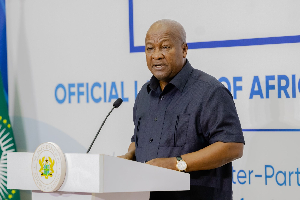Ghanaian President John Dramani Mahama on Tuesday urged the leadership of the Economic Community of West African States (ECOWAS) to deepen the use of soft diplomacy to restore trust in the subregional bloc.
Mahama said during the launching of the ECOWAS 50th anniversary celebrations that the celebrations should a turning point for diplomacy in West Africa, urging more investment in early warning systems, mediation capacities, and youth and women as peacebuilders.
“Let us position ECOWAS not only as a political and economic bloc but as a diplomatic anchor for the continent, a model of integration, dialogue, and peaceful coexistence,” Mahama urged.
He said diplomacy is not only about resolving disputes but also about creating the conditions for peace, inclusion, and progress. “It is about fostering mutual respect and advancing common interests.”
Mahama described the recent decision by Mali, Burkina Faso, and Niger to withdraw from ECOWAS as a sobering development, adding that even in that situation, diplomacy must remain the lodestar. “We must respond not with isolation or recrimination, but with understanding, dialogue, and a willingness to listen and engage.”
“Ghana stands ready to serve as a diplomatic bridge to help reknit the fabric of West African unity. We believe that through sustained dialogue, patient diplomacy, and principled negotiation, we can restore cohesion and rebuild trust in our community.
As the subregional bloc looks to the next 50 years, the Ghanaian president urged, “Let diplomacy lead us. Let it guide how we respond to insecurity, how we manage diversity, and how we build prosperity together. ECOWAS must remain a forum of listening, a space for healing, and a home for visionary, African-led diplomacy.”
As a gesture for deepening cohesion, Mahama announced that Ghana would award 1,000 scholarships to tertiary students from the subregion to study in Ghanaian universities.
As the subregional bloc marks its golden jubilee, Touray noted that one area worth reflecting on is the intracommunity trade, which still stands at 12 percent despite the customs union. “To resolve this, we must continue to address the infrastructure and energy deficit, and more importantly, address supply-side constraints by raising productivity in our community,” Touray urged.

